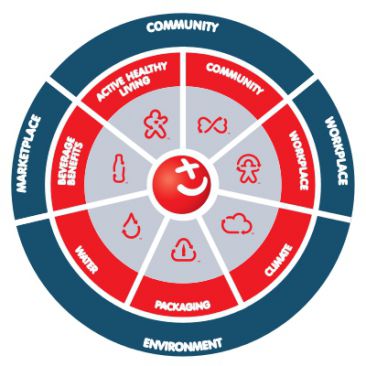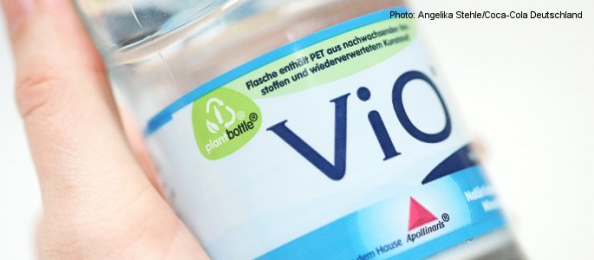Combining Sustainability with Happiness
Coca-Cola has been operating in Germany for more than 80 years and was named the world’s most valuable brand yet again in 2012 by Interbrand. Consumers increasingly expect the manufacturers of their favorite brands to operate in an ecologically, socially, and economically responsible manner in order to protect the natural resources of society – today and in the future. In 2011 Coca-Cola Germany was presented with the Silver Award for Sustainable Manufacturer by Die Verbraucher Initiative e.V. (consumer initiative association).
The strategy of Coca-Cola Germany is not geared toward individual sustainable products but toward the entire production and distribution process for all products. In this connection, goals have been defined in seven fields of sustainability. With a view toward a balanced diet, the company offers more than 70 products in all segments of non-alcoholic beverages – from soft drinks such as sports drinks, iced teas, juices, and juice spritzers to several types of water. For all soft drinks, iced teas, and sports drinks, there is always a sugar-free and calorie-free alternative. Transparent product information on the label ensures that consumers can obtain comprehensive information to make the right purchasing choice.
| Initiator | Coca-Cola Deutschland |
| Project start | - |
| Status | ongoing |
| Region | Germany |
| Contact person | Uwe Kleinert |
| Awards | Silver Award for Sustainable Manufacturer |
Project benefit
- Sustainable production
- ESG-Performance
| Anti-Corruption | - |
| Business & Peace | - |
| Development | - |
| Environment | - |
| Financial Markets | - |
| Implementing UNGC Principles in your Corporate CSR Management | X |
| Human Rights | - |
| Labour Standards | - |
| Local Networks | - |
| Advocacy of global issues | x |
| Business opportunities in low income communities/countries | - |
| Project funding | - |
| Provision of goods | - |
| Provision of services/personal | - |
| Standards and guidelines development | X |
At the same time, Coca-Cola has committed itself to responsible marketing and sales and has this audited externally: We respect the role of parents and the school in the education of children. Therefore, we do not target any advertising to children below the age of 12 and consider schools to be advertising-free zones. In concrete terms, this means that: no advertising is inserted in media that targets more than 35 percent of children below the age of 12; no beverages are sold in primary schools; in secondary schools, products from at least three beverage categories are offered, including one that is calorie-free; and vending machines are designed in a brand-neutral manner.
Coca-Cola Germany also promotes active lifestyles on a day-to-day basis through “Mission Olympic – Wanted: Germany’s most active city,” which is an initiative for urban citizens to make private commitments to engage in more physical activity. Coca-Cola has set itself the goal of producing in a water-neutral manner by 2020. With the Water Saver Program, developed together with WWF, water consumption in the production process is being continuously reduced. Processed water is treated and fed back into the water circuit in such a way that it corresponds to natural conditions to protect the fish.
Finally, the water required for the beverages themselves is to be replaced by 2020 through water recovery projects (e.g. rain recovery, building of wells). Already today, around 400 of these projects are up and running around the world. In the field of climate protection, the company is working on the supply chain in areas in which the highest savings can be reached, for example through the use of self-developed energy-saving modules, which lower energy consumption for about 85,000 cooling facilities by up to 30 percent.

The Energy Saver Program – developed in conjunction with WWF – saves energy during production; electricity for production has been procured exclusively from renewable energy sources since 2011. In the field of packaging, new technologies are continuously saving material. Coca-Cola has developed the PlantBottle™ and launched the first plastic bottle that consists partly of renewable resources. The long-term goal is to produce the plastic bottles from 2020 onwards from PlantBottle™ bottles only, and hence save on raw materials. With a recycled share of more than 60 percent, Coca-Cola boasts a share that is almost three times higher than the market average for non-alcoholic beverages (22.4%).
As an employer, Coca-Cola promotes above all the diversity of its associates and women in management positions. The community commitment of the company and its associates at the more than 60 locations in Germany are part of the basic understanding of corporate social responsibility. The company organizes every year a sustainability activation month, during which more than 500 associates are involved in 40 to 50 regional ecological or social projects.
In 2012 Coca-Cola Germany published its second Sustainability Report, now at the highest level (A+) of the Global Reporting Initiative (GRI), and it also issued its declaration of conformity under the German Sustainability Code. At the point of sale, the most important topics can be retrieved using the barcoo app, which permits access to independent information on products via a smartphone, and through which the complete report can be obtained.
Sustainability messages are also increasingly included in brand communication. Dialog with stakeholders has shown that these groups expect Coca-Cola to use the strength of its brands to draw attention to social challenges, contribute to their solution, and hence motivate consumers to engage in a more sustainable lifestyle. A survey conducted together with Die Verbraucher Initiative e.V. showed, moreover, that people associate sustainability today more strongly with joy of living than with renunciation. Sustainability matches the core values of many Coca-Cola brands. Already in the past, the Xmas truck tour was used to support social initiatives financially and in terms of communication (Nordoff Robbins Foundation, SOS children villages, A Heart for Children). Today, Mission Olympic places happiness and physical activity center stage and Coca-Cola leverages the awareness of its own brands in order to promote socially relevant topics. With Coca-Cola light, the company wishes to raise awareness about the heart health of women. In December 2011, it started the initiative “Listen to Your Heart” with the German Society for Gender Medicine as a partner. This was followed in 2012 by the Fanta Playground Initiative for safer and free playing, together with the German Child and Youth Welfare Organization and TÜV Rheinland. The company envisages an increasing integration of these aspects into its communication about future brands that represent a positive attitude toward life.

Coca-Cola has been represented in Germany since 1929. Today more than 10,000 associates work at more than 60 locations in Germany – 24 of which are production facilities. Coca-Cola offers more than 70 products in all segments of non-alcoholic beverages. A socio-economic impact study by the consultants Steward Redqueen showed that through the entire value chain of Coca-Cola in Germany, a total economic output of €6.1 billion is generated directly and indirectly, €2.9 billion is paid in taxes, and 119,000 jobs are protected.
This project description was originally presented in the Global Compact International Yearbook 2013.
Uwe Kleinert works as Head of Corporate Responsibility for Coca-Cola Germany.
Coca-Cola is a carbonated soft drink sold in stores, restaurants, and vending machines in many countrys around the world. It is produced by The Coca-Cola Company of Atlanta, Georgia. Coke is a registered trademark of The Coca-Cola Company in the United States since March 27, 1944. Originally intended as a patent medicine when it was invented in the late 19th century by John Pemberton, Coca-Cola was bought out by businessman Asa Griggs Candler, whose marketing tactics led Coke to its dominance of the world soft-drink market throughout the 20th century.
Coca Cola Deutschland is part of the Coca Cola Company and provide Softdrinks, Water and Juices in Germany. Today more than 10,000 associates work at more than 60 locations in Germany – 24 of which are production facilities. Coca-Cola offers more than 70 products in all segments of non-alcoholic beverages.
Source: Coca Cola Deutschland
Write a comment about this page
Your comments are provided by your own free will and you take sole responsibility for any direct or indirect liability. In order to maintain the highest discussion quality, all comments will be reviewed by our editors. You hereby provide us with an irrevocable, unlimited, and global license for no consideration to use, reuse, delete or publish comments in accordance with our Community Guidelines.
0 Comments
About Us // Privacy Policy // Copyright Information // Legal Disclaimer // Contact
Copyright © 2012-2018 macondo publishing GmbH. All rights reserved.
The CSR Academy is an independent learning platform of the macondo publishing group.









